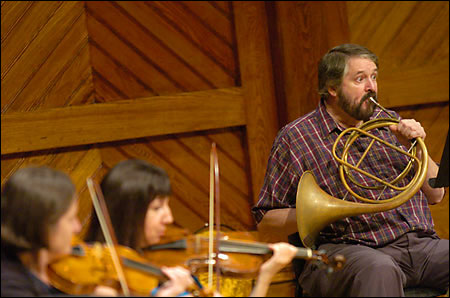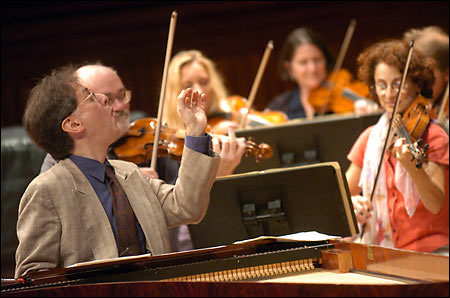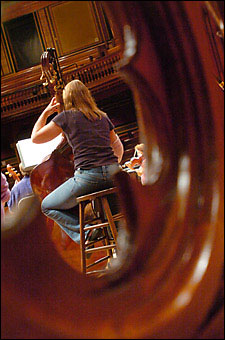A musical feast honors Christoph Wolff
Scholar celebrated with four days of concerts and scholarship

This past week, Harvard reverberated with some of the greatest music ever composed, performed by some of its finest interpreters.
The occasion was “The Century of Bach and Mozart: Perspectives on Historiography, Composition, Theory, and Performance,” a four-day event that combined scholarly papers with a pair of superb musical concerts. The event honored Christoph Wolff, the Adams University Professor and Curator of the Isham Memorial Library.

Wolff has earned the honor. One of the world’s leading Bach and Mozart scholars, Wolff has not only written extensively about these composers, but has made important discoveries of lost or unknown Bach manuscripts. In 1984 he uncovered 33 previously unknown works by Johann Sebastian Bach at the Yale School of Music. The collection had come to the school in 1852, but had been misleadingly labeled and escaped the notice of scholars.
In 1999, Wolff helped discover a collection of scores by Bach’s oldest son, Carl Philipp Emanuel Bach, hidden in a Ukrainian archive in Kiev. The collection, whose whereabouts were unknown since the 1940s, had been moved from Berlin to the German province of Silesia during World War II. When the war ended, Silesia reverted to Poland, and the collection disappeared behind the Iron Curtain.
Wolff, who was born and educated in Germany, also serves as director of the Bach-Archiv in Leipzig, chair of the Akademie für Mozart-Forschung in Salzburg, and president of the Répertoire International des Sources Musicales. At Harvard he was dean of the Graduate School of Arts and Sciences (1992-2000).
“This is something the Music Department has done several times in the past – honoring a colleague by organizing a conference that focuses on their area of interest,” said Thomas Kelly, the Morton B. Knafel Professor of Music. “In this case, the President’s Office has helped to sponsor the event because Christoph Wolff is a University Professor. I’m very proud of that.”
Robert Levin, the Dwight P. Robinson Jr. Professor of Music Performance and Analysis, called Wolff “a linchpin figure of the Harvard faculty. We decided to honor him by gathering a conclave of major scholars from all over the world, and we thought it would be appropriate to have music made as well as discussed.”

Levin, one of the few musicians whose public performances include cadenzas improvised on the spot in the manner of 18th century musicians like Bach and Mozart, credited Wolff with providing the historical and artistic insights that help him attempt such risk-taking.
“When you improvise, things can go terribly wrong, or they can go terribly right. We depend on people like Wolff to helpA musical feast honors Christoph Wolff us. It’s their scholarship and insight that helps to define performance.”
Wolff, an accomplished keyboard player in his own right, is one of those scholars who has helped to bring together scholarship and performance,” said Levin.
“There’s been a sea change in academia over the last few decades,” he said. “Today, most music scholars are also accomplished performers.”

The event kicked off with a concert on the evening of Sept. 22 in Paine Hall, featuring the Harvard Baroque Chamber Orchestra, Robert Mealy, director. The orchestra performed an all-Bach program with harpsichordists Ton Koopman, Tini Mathot, and Levin. The concert followed the somewhat unusual plan of adding a harpsichord with each new piece. First came Bach’s Harpsichord Concerto in A Major, followed by his Concerto for Two Harpsichords in C Minor, and finally the Concerto for Three Harpsichords in D Minor.
Bach actually wrote a concerto for four harpsichords, which Levin, who organized the concerts, hoped to present as well, but this proved too much of an organizational challenge.
The second concert took place Sept. 24 in Sanders Theatre with the orchestra of the Handel and Haydn Society, Christopher Hogwood, conductor. The soloists were pianists Levin and his wife, Ya-Fei Chuang, and Dominique LaBelle, soprano. This was an all-Mozart concert, featuring the Symphony in B-flat, the Piano Concerto in E-flat Major, the concert aria “Ah lo previdi,” and the Concerto for Two Pianos in E-flat Major.
The scholarly part of the conference took place Sept. 23-25 with papers on the music’s intellectual background, methods of composition, and issues of interpretation. The conference, including the two concerts, was free and open to the public.

“We plan to publish all the papers in book form so that we will not only be honoring a colleague but making a contribution to the world at large,” said Kelly.




